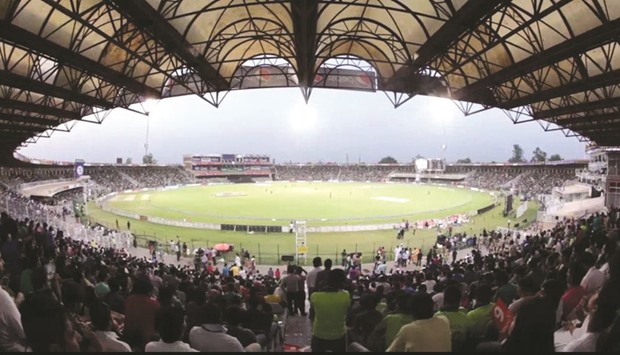With a second fatality-ridden explosion inside 10 days in Lahore, will the Pakistan Super League (PSL) final be held in the art and cultural capital next Sunday? This is the super question dogging a cricket-mad republic deprived of international action at home for the last eight years (save for a whistle stop tour in 2015 by Zimbabwe, forced ironically, by its own empty kitty).
If there was a semblance of justice in the world, Pakistan would be hosting the sport it loves to death just like other nations do, but after carrying the world’s burden in fronting up to the most hardened terrorist outfits on the planet for more than one-and-a-half decade, it finds itself in isolation, but fantastically refusing to die – the flame of hope flickering; the heart, mind and body waltzing to the famed Lahori spirit.
The birth of PSL last year with five franchises named after provincial capitals and the seat of the federation fetching international stars was more than a shot-in-the-arm for Pakistan cricket; it became a rallying point for a nation hooked onto the only game it wears on its sleeve.
After the rousing success of the inaugural edition – the entire tournament was played out in the UAE, the adopted home of Pakistan cricket, following an attack on the visiting Sri Lankan team in Lahore in 2009 that closed the doors of international cricket on Pakistan – the sense of anticipation reached a fever pitch with a predictable demand to bring some part of the action back home. Hence, the Pakistan Cricket Board (PCB)’s decision to host the final in Lahore. It held on to that stance even after the Federation of International Cricketers’ Association (FICA) took issue with a damning report of its security assessment last month.
Warning that the risk level in Pakistan remained “at an extremely elevated state”, it went on to add that “an acceptable level of participant security and safety cannot be expected or guaranteed”.
While FICA is not endowed with powers to prevent players from travelling, its report circulated to players, their agents and player associations around the world had enough meat to influence already wary national boards and domestic teams to decline an NOC to their players. The warning was reinforced with a catchy clickbait for the players to “check their insurance cover” – the terse suggestion being that it could be invalidated by travelling to Pakistan!
Aware that a robust and wide-ranging security arrangement would be the focus of a more convincing argument in favour of resuming international sporting action in Pakistan, especially after Giles Clarke, chairman of the International Cricket Council Task Force on Pakistan, returned home impressed following a detailed inspection visit, FICA threw a quick dampener on that, too.
“Whilst the opportunity for attack on international sporting events and competitors in Pakistan can be mitigated to a certain extent by the implementation of an extremely robust security plan, the current advice is that external security environmental factors keep the risk level in Pakistan at an extremely elevated state, where an acceptable level of participant security and safety cannot be expected or guaranteed, even with an extremely robust security plan,” FICA declared, ending the report with a short shrift: “Players participating in this event do so as individuals and at their own risk.”
This drew a swift rebuke from the PCB, which rejected the FICA assertion. “This is a careless and cavalier approach to an issue of great importance. FICA sits thousands of miles away from Pakistan and cannot name even one credible security expert, yet makes a sweeping negative statement about the security situation in Lahore. FICA’s claim that ‘westerners and luxury hotels have been attacked’ is contrary to the facts on the ground that prove that not a single foreigner or hotel has been attacked in Lahore in the last five years,” the Pakistani board bristled.
To reinforce its argument, the PCB recalled the successful hosting of both men and women’s international teams in the interim, and the massive security undertaking for the PSL final in Lahore.
“PCB has recently hosted Kenya, Zimbabwe, Bangladesh (Women), Afghanistan and Malaysian national cricket teams in Lahore and Karachi without any problem. In the case of PSL final in Lahore for one day, the government has guaranteed protection by over 3,000 army and police personnel in Lahore. PCB will provide armoured buses for travel along with VVIP security protocols.”
However, while there can be favourable arguments on both sides, it is crucial – perhaps, even critical – that Pakistan take a holistic view of what’s at stake even if it believes it has a strong case and resolve to prove a point to all enemies trying to scuttle the possibility of that much coveted final in Lahore as part of a sustained design to keep the country isolated.
After the suicide attack on Lahore’s famous Charing Cross area on Valentine’s Day eve which left 13 people dead, a second incident, which the provincial government of Punjab claims was a cylinder blast at an under-construction café in upmarket DHA area and not an act of terror, but which killed 8 people nevertheless, it is best not to lose sight of the long term future rather than pander to the uncertain present for a statement of intent.
Granted it would hurt not to see the lights shimmering down the Gaddafi Stadium as promised next Sunday eve, but the emotional current of fierce determination and resolve should be weighed against the will, ability and deliverance of a security detail that protects not only the players and VVIPs of all hues, but the cricket crazy fans who will rush in their thousands to get into the stadium, cometh the hour. Historically, the enemies of peace have zeroed in on soft target/s when the high and mighty are beyond reach.
Security is infinitely more important; cricket will follow. After all, you can’t keep a passionate nation down for long!
* The writer is Community Editor.

WAITING GAME: The historic Gaddafi Stadium in Lahore is dying to get back into the frame.

